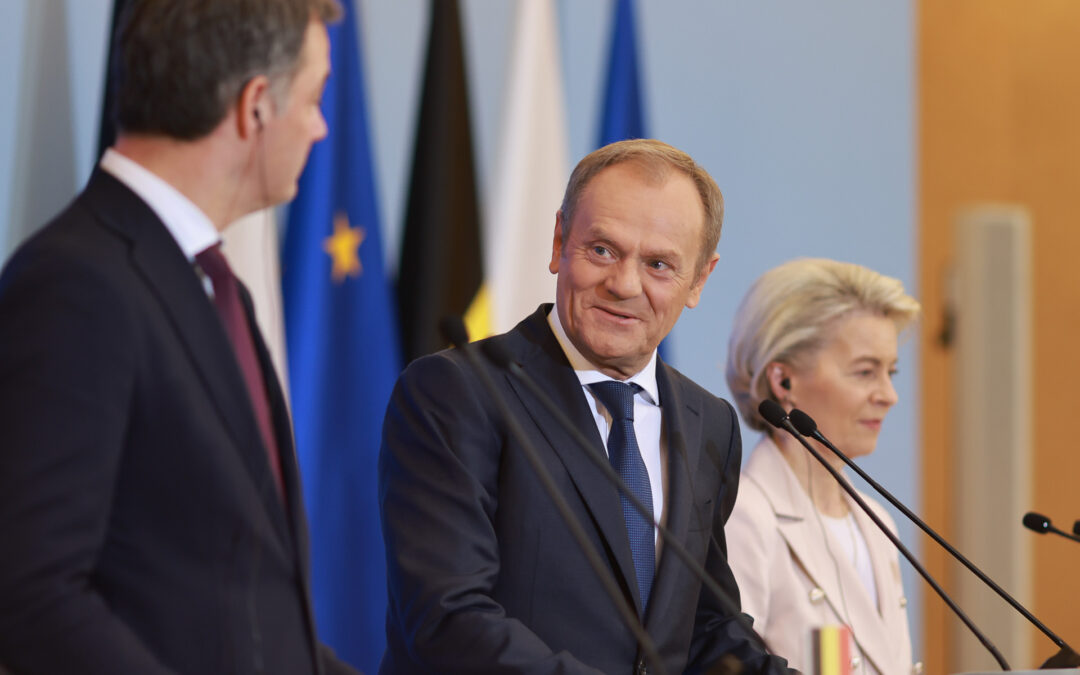Poland has been handed the European Commission’s budget portfolio in the new team proposed today by President Ursula von der Leyen to lead the EU’s executive body for the next five years.
Polish candidate Piotr Serafin has been nominated as commissioner for budget, anti-fraud and public administration, a role that will hand him oversight of preparations for the EU’s next long-term budget.
Serafin’s candidacy – along with those of the remaining members of von der Leyen’s proposed commission – will now be subject to approval in the European Parliament.
Every member of my team will bring in their own experience and perspectives on Europe.
Together, we will be one team, working towards one common goal.
To make Europe stronger. pic.twitter.com/xIvDNv4C7t— Ursula von der Leyen (@vonderleyen) September 17, 2024
Serafin, a former chief of staff to Prime Minister Donald Tusk when the latter was president of the European Council, was nominated as Poland’s candidate for the commission last month. It was widely reported that he would be handed the budget brief.
“A strong portfolio for Polish Commissioner Piotr Serafin: budget, public administration and combating fraud,” tweeted Tusk today in response to the news. “In other words: money, personnel and what we like the most.”
Prior to working with Tusk in Brussels from 2014 to 2019, Serafin served for two years as a deputy foreign minister in a previous Tusk-led government. From 2010 to 2012, he was deputy chief of staff to then EU budget commissioner Janusz Lewandowski.
Since December 2023, when the current Tusk-led ruling coalition came to power in Poland, Serafin has been serving as Poland’s ambassador to the EU.
Sorry to interrupt your reading. The article continues below.

Notes from Poland is run by a small editorial team and published by an independent, non-profit foundation that is funded through donations from our readers. We cannot do what we do without your support.
Serafin will be one of the three commissioners who will report directly to von der Leyen and not to one of her six deputies. The other two are Maroš Šefčovič of Slovakia as trade commissioner and Valdis Dombrovskis of Latvia as economy commissioner.
Elsewhere, Lithuania’s Andrius Kubilius has been handed the newly created position of defence commissioner and former Estonian Prime Minister Kaja Kallas will be in charge of foreign and security policy. The full list of nominees is available here.
Each commissioner-designate will have to appear for assessment before the EU’s parliamentary committees in their prospective fields of responsibility. If a candidate receives a negative evaluation from the committee, their candidacy is withdrawn.
Then, the composition of the entire European Commission must be approved by a majority of the European Parliament in a single vote.
If Serafin’s candidacy is accepted, he will develop the EU’s 2028-2034 budget. Since joining the bloc in 2004, Poland has been the largest net beneficiary of the EU budget. Last year, it received €8.2 billion more than it paid, according to the Cologne Institute for Economic Research.
We have prepared 20 charts to mark 20 years of Poland's EU membership.
They illustrate its dramatic transformation over that time – from rapid economic growth and declining poverty to the expansion of infrastructure and a reversal of migration trends https://t.co/ylV2vvBjPG
— Notes from Poland 🇵🇱 (@notesfrompoland) May 16, 2024
However, Polish opposition MEP Piotr Müller, who served as spokesman for the former Law and Justice (PiS) government until last year, argues that Poland has not been given a beneficial position in the new commission.
“Poland needs someone more than an accountant in the European Commission,” tweeted Müller. “Polish interests, in particular those of the Polish economy, are with other commissioners.”
“We should seek functions that impact legislation concerning key spheres for Poland,” he said, mentioning industry, energy, the internal market and agriculture. In the outgoing commission, Poland’s Janusz Wojciechowski held the agriculture portfolio.
“We need to reformat the Green Deal, we need to strengthen our security (including energy security), we need to take care of Polish farmers and the results of their work, we need to help our companies,” added Müller.
Polska potrzebuje w Komisji Europejskiej kogoś więcej niż księgowego.@vonderleyen przedstawiła proponowany skład Komisji Europejskiej.
Jakie sprawy gospodarcze są obecnie najistotniejsze w UE dla Polski? To m. in.:
• Przemysł
• Energia
• Rynek… https://t.co/zM7wBcHSl1— Piotr Müller (@PiotrMuller) September 17, 2024
Main image credit: KPRM (under CC BY-NC-ND 2.0)

Alicja Ptak is deputy editor-in-chief of Notes from Poland and a multimedia journalist. She has written for Clean Energy Wire and The Times, and she hosts her own podcast, The Warsaw Wire, on Poland’s economy and energy sector. She previously worked for Reuters.



















